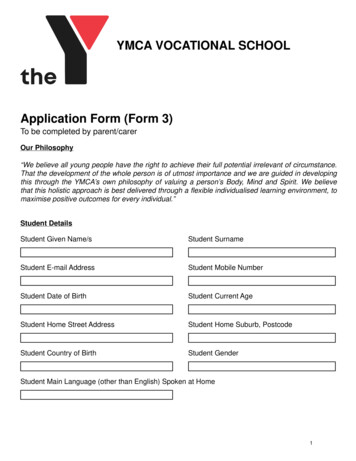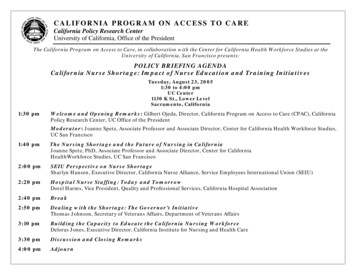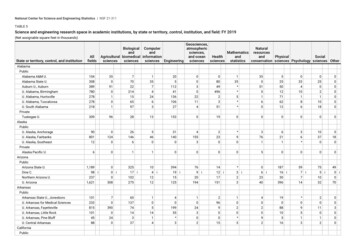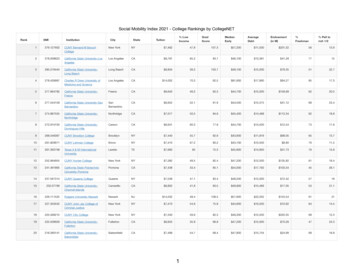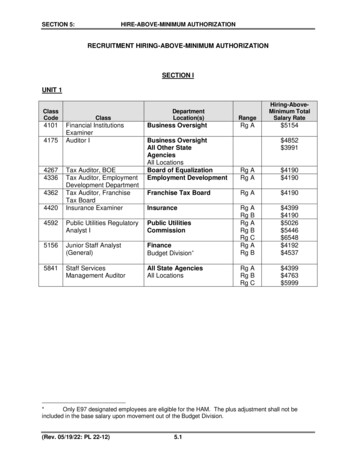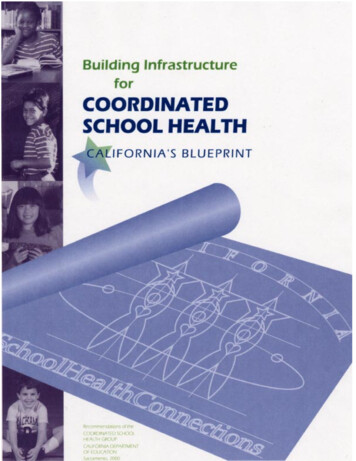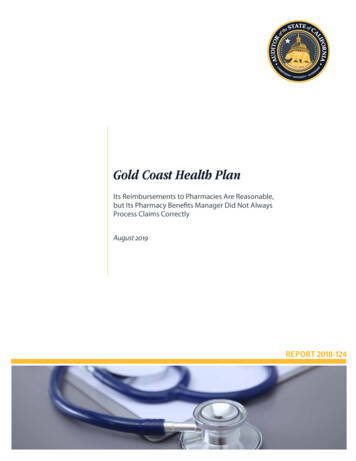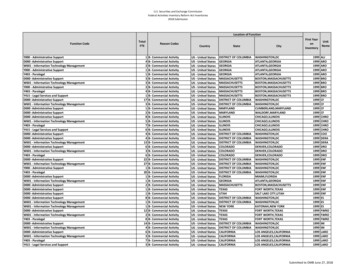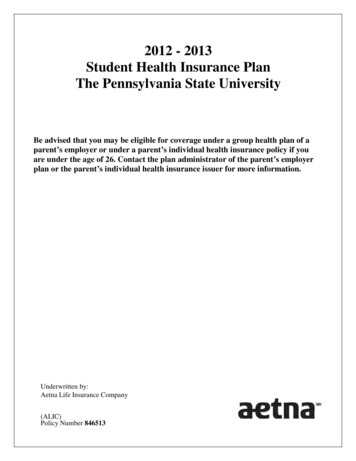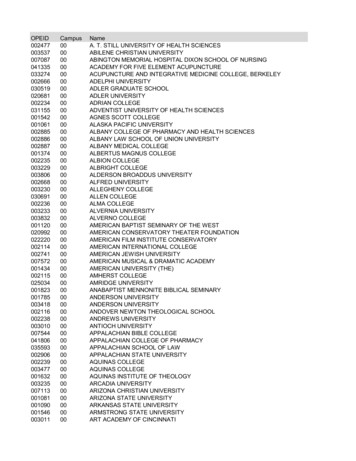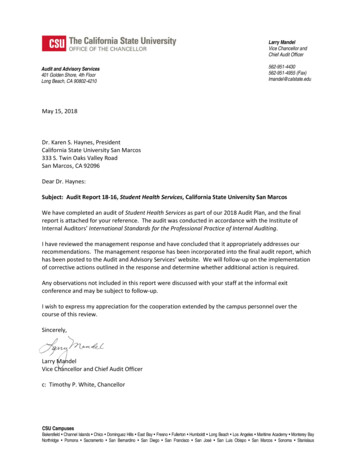
Transcription
Larry MandelVice Chancellor andChief Audit OfficerAudit and Advisory Services401 Golden Shore, 4th FloorLong Beach, CA 90802-4210562-951-4430562-951-4955 (Fax)lmandel@calstate.eduMay 15, 2018Dr. Karen S. Haynes, PresidentCalifornia State University San Marcos333 S. Twin Oaks Valley RoadSan Marcos, CA 92096Dear Dr. Haynes:Subject: Audit Report 18-16, Student Health Services, California State University San MarcosWe have completed an audit of Student Health Services as part of our 2018 Audit Plan, and the finalreport is attached for your reference. The audit was conducted in accordance with the Institute ofInternal Auditors’ International Standards for the Professional Practice of Internal Auditing.I have reviewed the management response and have concluded that it appropriately addresses ourrecommendations. The management response has been incorporated into the final audit report, whichhas been posted to the Audit and Advisory Services’ website. We will follow-up on the implementationof corrective actions outlined in the response and determine whether additional action is required.Any observations not included in this report were discussed with your staff at the informal exitconference and may be subject to follow-up.I wish to express my appreciation for the cooperation extended by the campus personnel over thecourse of this review.Sincerely,Larry MandelVice Chancellor and Chief Audit Officerc: Timothy P. White, ChancellorCSU CampusesBakersfield Channel Islands Chico Dominguez Hills East Bay Fresno Fullerton Humboldt Long Beach Los Angeles Maritime Academy Monterey BayNorthridge Pomona Sacramento San Bernardino San Diego San Francisco San José San Luis Obispo San Marcos Sonoma Stanislaus
CSUThe California State UniversityAudit and Advisory ServicesSTUDENT HEALTH SERVICESCalifornia State UniversitySan MarcosAudit Report 18-16April 18, 2018
CALIFORNIA STATE UNIVERSITY SAN MARCOS – STUDENT HEALTH SERVICESEXECUTIVE SUMMARYOBJECTIVEThe objectives of the audit were to ascertain the effectiveness of campus operational,administrative, and financial controls over the administration of student health services (SHS)activities and to ensure compliance with relevant governmental regulations, Trustee policy,Office of the Chancellor directives, and campus procedures.CONCLUSIONWe found the control environment for some of the areas reviewed to be in need ofimprovement.Based upon the results of the work performed within the scope of the audit, except for theweaknesses described below, the operational, administrative, and financial controls forstudent health services as of March 2, 2018, taken as a whole, provided reasonable assurancethat risks were being managed and objectives were met.In general, we noted that the campus had an appropriate framework for the administration ofhealth services at Student Health and Counseling Services (SHCS). We identified areas needingimprovement, including instances in which SHCS contracts and agreements did not alwaysinclude the required campus approvals or were not executed by individuals with the delegatedauthority to commit resources or obligate the university contractually. In addition, thepharmacy’s internal controls did not provide assurance that inventory of controlled substanceswas accurate. Also, SHCS incorrectly charged students an additional fee for basic diagnostic Xray services and used unallowed billing practices to recover some operational costs of providingfamily planning services to eligible students.We also found that oversight responsibilities in the sports medicine program neededimprovement, primarily with regard to security, credential review of volunteer communitymedical providers, and general administrative requirements. Further, the campus did notalways enforce registration holds to ensure compliance with campus student immunizationrequirement policies and procedures, did not conduct a formal risk assessment for all SHCSinformation systems, and did not establish the required student health advisory committee thatadvises the campus president and SHCS.Specific observations, recommendations, and management responses are detailed in theremainder of this report.Audit Report 18-16Audit and Advisory ServicesPage 1
CALIFORNIA STATE UNIVERSITY SAN MARCOS – STUDENT HEALTH SERVICESOBSERVATIONS, RECOMMENDATIONS, AND RESPONSES1. CONTRACT ADMINISTRATIONOBSERVATIONAdministrative oversight of SHCS contracts and agreements, including proper review andapproval by the Office of General Counsel (OGC) and campus procurement and supportservices, needed improvement.Specifically, we found that: For two active educational program agreements in which SHCS participated with outsideuniversities as a host for clinical rotation sites that involve the provision of health care atSHCS facilities, the campus did not obtain OGC approval as required by Executive Order(EO) 943, Policy on University Health Services. Two separate contractual agreements to provide offsite basic diagnostic X-ray servicesand procure clinical reference laboratory services were signed by someone who did nothave the authority to commit resources or otherwise obligate the university contractually. A SHCS memorandum of understanding (MOU) with a campus auxiliary that allows eligiblestudents from the American Language and Culture Institute Intensive Academic Programto access student health services expired in 2010 and has not been formally renewedthrough the established campus procurement and contract process.Proper review and approval of contractual agreements helps to reduce risk, can protect theuniversity from adverse financial and legal obligations, and promotes compliance. In addition,active monitoring helps to ensure that contracts and agreements are current and do not lapse.RECOMMENDATIONWe recommend that the campus:a. Ensure that proper review and approval is obtained for all educational programagreements that include the provision of health care to students, and remind appropriatecampus staff of the requirements of EO 943 related to health care educational programs.b. Obtain necessary campus approval for the two agreements noted above that were notsigned by someone with the authority to commit resources or otherwise obligate theuniversity contractually, and remind appropriate SHCS staff of key university policies andprocedures for procurement and contracts.c. The expired MOU noted above should be renewed to comply with the campusProcurement & Support Services Policy.Audit Report 18-16Audit and Advisory ServicesPage 2
CALIFORNIA STATE UNIVERSITY SAN MARCOS – STUDENT HEALTH SERVICESMANAGEMENT RESPONSEWe concur.a. The campus will ensure that proper review and approval is obtained for all educationalprogram agreements that include the provision of health care to students and remindappropriate campus staff of the requirements of EO 943 related to health careeducational programs.b. The campus will obtain necessary campus approval for the two agreements noted abovethat were not signed by someone with the authority to commit resources or otherwiseobligate the university contractually and remind appropriate SHCS staff of key universitypolicies and procedures for procurement and contracts.c. The expired MOU noted above will be renewed to comply with the campus Procurement& Support Services Policy.Estimated completion date: October 18, 20182. INVENTORY CONTROLSOBSERVATIONInternal controls surrounding the pharmacy’s inventory of controlled substances neededimprovement to provide assurance of accurate records.We performed an actual count and reconciliation of the pharmacy’s controlled substances toverify the inventory on-hand, and we found that: For two controlled substances, our actual counts did not reconcile to the independentcount performed by a third-party vendor in June 2017. Specifically, our counts were overthe reconciled vendor’s count by 18 and 40 pills, respectively.According to SHCS management, the vendor performs an annual inventory of thepharmacy formulary and uses a counting method of estimation, meaning that the numberof pills in a container may be counted in even numbers and estimated rather than countedpill-by-pill. We noted that the vendor’s method is not appropriate for controlledsubstances. The current pharmacy management system is outdated and unable to maintain a currentinventory count. According to campus staff, the university is in the process ofimplementing an improved pharmacy management system that will be able to maintain aperpetual inventory, among other things. An adequate pharmacy management systemcan track the amount of medication on hand and automatically update the inventory asthe medication is dispensed, purchased/replenished, and discarded.Proper inventory controls, including reliable independent annual inventory counts andpharmacy management systems that are capable of maintaining reliable records overAudit Report 18-16Audit and Advisory ServicesPage 3
CALIFORNIA STATE UNIVERSITY SAN MARCOS – STUDENT HEALTH SERVICESpharmaceuticals, helps to reduce the risk of loss or theft and non-compliance with applicableregulations.RECOMMENDATIONWe recommend that the campus:a. Require and ensure that the third-party vendor who performs inventory of the pharmacyformulary confirms the pharmacy’s pill-by-pill count of controlled substances.Additionally, determine whether the vendor’s methods are appropriate for non-controlledsubstances, and communicate any necessary changes to the vendor.b. Ensure that the new pharmacy management system capabilities are fully implementedand utilized.c. Ensure that SHCS management uses the annual inventory count to conduct anindependent review and reconciliations of pharmaceutical inventories, especially forcontrolled substances.MANAGEMENT RESPONSEWe concur.a. The campus will require and ensure that the third-party vendor who performs inventoryof the pharmacy formulary confirms the pharmacy’s pill-by-pill count of controlledsubstances. Additionally, we will determine whether the vendor’s methods areappropriate for non-controlled substances and communicate any necessary changes tothe vendor.b. The campus will ensure that the new pharmacy management system capabilities are fullyimplemented and utilized.c. The campus will ensure that SHCS management uses the annual inventory count toconduct an independent review and reconciliations of pharmaceutical inventories,especially for controlled substances.Estimated completion date: October 18, 20183. FEE ADMINISTRATIONOBSERVATIONAdministration of some basic health services fees and the billing of Family Planning, Access,Care and Treatment (Family PACT) did not always comply with EO 943, Policy on UniversityHealth Services, and Coded memorandum Academic Affairs (AA) 2015-08, Clarifications toExecutive Order 943.Audit Report 18-16Audit and Advisory ServicesPage 4
CALIFORNIA STATE UNIVERSITY SAN MARCOS – STUDENT HEALTH SERVICESSpecifically, we found that: SHCS was not providing onsite X-ray services but had a contract with an offsite third-partyvendor for these services. SHCS incorrectly charged students an additional fee for basicdiagnostic X-ray service, which is a basic health service that is already included in themandatory student health fee. The SHCS is not allowed to charge an additional fee forbasic services or for services that do not meet the specific criteria outlined in EO 943Section III D-1. SHCS was providing family-planning services, including certain standard laboratory tests,to eligible students through Family PACT, at no additional charge. SHCS was directlybilling Family PACT for two laboratory diagnostic tests (UA Dip and UCG, also known asurine analysis and urine pregnancy test), primarily to help recover some of theiroperational costs. However, AA-2015-08 specifically states that student health centersmay not bill governmental or other agency programs more than the amount charged tothe students paying user charges directly, and because the tests noted above are requiredto be provided to eligible students at no additional charge, billing Family PACT is notappropriate.Proper fee administration over charges for basic services and Family PACT billings ensurescompliance with California State University (CSU) requirements.RECOMMENDATIONWe recommend that the campus immediately discontinue charging students an additional feefor basic diagnostic X-ray services and billing Family PACT for the two laboratory diagnostictests noted above and remind appropriate campus staff of the prohibited practices as notedabove.MANAGEMENT RESPONSEWe concur. The campus will immediately discontinue charging students an additional fee forbasic diagnostic X-ray services and billing Family PACT for the two laboratory diagnostic testsnoted above, and will remind appropriate campus staff of the prohibited practices as notedabove.Estimated completion date: October 18, 20184. ATHLETICS SPORTS MEDICINE PROGRAMOBSERVATIONOversight responsibilities in the sports medicine program (SMP) related to security, review ofcommunity member medical providers (CMMP), and general SMP administration neededimprovement.Audit Report 18-16Audit and Advisory ServicesPage 5
CALIFORNIA STATE UNIVERSITY SAN MARCOS – STUDENT HEALTH SERVICESWe noted that security over the following SMP components required attention: Medical records were stored in an unlocked cabinet inside the sports office, which wasaccessible to athletic directors and management, who had a key to the office, and thecabinet key was not always properly secured. Mitigating controls such as password-protected send-and-receive functionality were notimplemented on the dedicated fax machine used to transmit and receive confidentialmedical records. In addition, the sports office where the fax machine is located wasaccessible to athletic directors and management, who had a key to the office. Over-the-counter (OTC) medicine was stored inside the sports office in a cabinet thatcould not be locked. In addition, the sports office was accessible to athletic directors andmanagement, who had a key to the office. Sports medicine kits were not always stored inside a lockable compartment when not inuse.We also found that current volunteer forms were not maintained for CMMPs, nor was thereevidence that CMMPs had been subject to a periodic credential review, as required by campushuman resources policy and EO 943.In addition, SMP administration needed improvement. Specifically, we noted: One sports medicine kit contained expired OTC items, and the expiration dates on somecontainers were unclear. Additionally, a written log documenting the routine inspectionof OTC items for removal of outdated/expired, deteriorated, or recalled medications wasnot maintained as required by EO 943. A quality assurance program similar to the program used by the campus SHCS andrequired by EO 943, to address, among other things, facility sanitation and safety issues,regular cleaning of instruments and equipment, and staff training, had not beendeveloped or implemented for the SMP at the time of the audit. There were two unused user accounts within one information system used by the SMP,which can increase vulnerability of confidential medical records. Policies and procedures for the SMP had not been formally approved in writing by thephysician responsible for medical oversight of the program, as required by EO 943.Effective management over the SMP can help to ensure that proper safeguards and securityexist over medical records, information systems, and sports medicine kits; that CMMPs arecredentialed and reviewed; and that administrative responsibilities are addressed to promotecompliance and reduce the campus exposure to potential litigation or regulatory sanctions.Audit Report 18-16Audit and Advisory ServicesPage 6
CALIFORNIA STATE UNIVERSITY SAN MARCOS – STUDENT HEALTH SERVICESRECOMMENDATIONWe recommend that the campus:a. Address the security concerns noted above by: Reminding appropriate sports medicine staff of policies and procedures formaintaining and safeguarding medical records including, but not limited to, lockingthe medical records cabinet at all times when it is not in use and securing the cabinetkey. Implementing password-protected send-and-receive fax functionality or otherappropriate mitigating controls to ensure faxed medical records transmitted andreceived are secured appropriately. Installing a lock on the cabinet where OTC medications are stored and ensuring thatkeys are properly secured at all times. Ensuring that sports medicine kits are always stored in a locked compartment and thatkeys are properly secured at all times.b. Implement a process to ensure that volunteer forms for CMMPs are renewed annually,including a periodic review of required credentials.c. Address SMP administration concerns noted above by: Reviewing all sports medicine kits and removing all outdated, expired, deteriorated, orrecalled medications, including the items noted above, and maintaining properdocumentation of all routine inspections conducted. Developing and implementing a quality assurance program for the sports medicine areasimilar to the one used by the campus SHCS. Ensuring that user access to SMP information systems is appropriate, and removing thetwo unused user accounts noted above. Finalizing the SMP policies and procedures, and obtaining approval in writing from theSHCS director.MANAGEMENT RESPONSEWe concur.a. We will address the security concerns by: Reminding appropriate sports medicine staff of policies and procedures for maintaining andsafeguarding medical records including, but not limited to, locking the medical recordscabinet at all times when it is not in use and securing the cabinet key.Audit Report 18-16Audit and Advisory ServicesPage 7
CALIFORNIA STATE UNIVERSITY SAN MARCOS – STUDENT HEALTH SERVICES Implementing password-protected send-and-receive fax functionality or other appropriatemitigating controls to ensure faxed medical records transmitted and received are securedappropriately. Installing a lock on the cabinet where OTC medications are stored and ensuring that keysare properly secured at all times. Ensuring that sports medicine kits are always stored in a locked compartment and that keysare properly secured at all times.b. We will implement a process to ensure that volunteer forms for CMMPs are renewedannually, including a periodic review of required credentials.c. We will address SMP administration concerns noted above by: Reviewing all sports medicine kits and removing all outdated, expired, deteriorated, orrecalled medications, including the items noted above, and maintaining properdocumentation of all routine inspections conducted. Developing and implementing a quality assurance program for the sports medicine areasimilar to the one used by the campus SHCS. Ensuring that user access to SMP information systems is appropriate and removing the twounused user accounts noted above. Finalizing the SMP policies and procedures and obtaining approval in writing from the SHCSdirector.Estimated completion date: October 18, 20185. IMMUNIZATION REQUIREMENTSOBSERVATIONThe campus did not always enforce registration holds to ensure compliance with the campusStudent Immunization Requirement Policy and Procedures.In general, the campus policies and procedures on student immunization requirements statesthat matriculated students must provide proof of full immunization against measles, rubella,and hepatitis B within the first year of enrollment and requires the campus to maintain theimmunization documents as a part of the student’s health record. In addition, if a studentdoes not provide proof of immunization by the established timeline, the campus is required toplace a hold on the student’s registration.At the time of the audit, we found that the campus had implemented a rule-based process toenforce immunization registration holds within the PeopleSoft module that manages studentenrollment and registration. We reviewed a sample of student registrations to verify whetherAudit Report 18-16Audit and Advisory ServicesPage 8
CALIFORNIA STATE UNIVERSITY SAN MARCOS – STUDENT HEALTH SERVICESthese rules were effective, and we found that the rules were not properly configured andresulted in immunization registration holds not being enforced for graduate, credentialed, andtransfer students.Proper implementation of immunization registration holds promotes compliance with campuspolicy and provides greater assurance that students have obtained required immunizations,and can reduce the risk related to the outbreak of diseases on campus.RECOMMENDATIONWe recommend that the campus verify that system-based rules are properly configured toensure registration holds are enforced for all applicable students as required by the campusStudent Immunization Requirement Policy and Procedures.MANAGEMENT RESPONSEWe concur. The campus will verify that system-based rules are properly configured to ensureregistration holds are enforced for all applicable students as required by the campus StudentImmunization Requirement Policy and Procedures.Estimated completion date: October 18, 20186. INFORMATION SYSTEMS RISK ASSESSMENTOBSERVATIONThe campus had not conducted a formal assessment of the potential risks and vulnerabilitiesto the confidentiality, integrity, and availability of electronic protected health information thatwas obtained and held in all SHCS information systems.Specifically, we found that: A formal risk assessment of the SHCS’s pharmacy management system had not beenconducted because the system was implemented before the campus established thecurrent risk assessment process. Moreover, the SHCS was in the process of implementinga new pharmacy management system to replace the current system. A formal risk assessment of the SHCS’s point-and-click electronic medical records (EMR)system had not been finalized because verification of some components was pending.According to EO 877, Designation of Health Care Components for Purposes of the Health CarePortability and Accountability Act of 1996 (HIPAA), the individual entities within the CSU thatare designated as health care components are required to comply fully with HIPAA, includingthe requirement to conduct a complete and accurate risk assessment.Adequate assessment of the potential risks and vulnerabilities to electronic protected healthinformation can help to safeguard the confidentiality of information collected from studentsand reduces campus exposure to potential regulatory sanctions.Audit Report 18-16Audit and Advisory ServicesPage 9
CALIFORNIA STATE UNIVERSITY SAN MARCOS – STUDENT HEALTH SERVICESRECOMMENDATIONWe recommend that the campus conduct a risk assessment of the potential risks andvulnerabilities to the confidentiality, integrity, and availability of electronic protected healthinformation obtained and held by the pharmacy management system and finalize the riskassessment for the EMR system.MANAGEMENT RESPONSEWe concur. The campus will conduct a risk assessment of the potential risks andvulnerabilities to the confidentiality, integrity, and availability of electronic protected healthinformation obtained and held by the pharmacy management system and finalize the riskassessment for the EMR system.Estimated completion date: October 18, 20187. STUDENT HEALTH ADVISORY COMMITTEEOBSERVATIONThe campus did not have an established student health advisory committee (SHAC).SHACs are required by EO 943, Policy on University Health Services, which states that eachpresident or designee shall establish a student health advisory committee to serve as advisoryto the president and to the SHCS on the scope of service, delivery, funding, and other criticalissues relating to campus health services, among other specific requirements andresponsibilities.Establishing a SHAC can help to ensure that students’ input on university health services isobtained and enables communication between the committee, the campus president, and theSHCS on critical health issues.RECOMMENDATIONWe recommend that the campus establish a SHAC.MANAGEMENT RESPONSEWe concur. The campus will establish a SHAC.Estimated completion date: October 18, 2018Audit Report 18-16Audit and Advisory ServicesPage 10
CALIFORNIA STATE UNIVERSITY SAN MARCOS – STUDENT HEALTH SERVICESGENERAL INFORMATIONBACKGROUNDThe primary health entity on each CSU campus is the student health center (SHC). EO 943,Policy on University Health Services, outlines the health services that campuses may provide,funding sources for these services, and the conditions for adding additional services orincreasing fees. The EO also addresses qualifications of health care providers, operationalexpectations for pharmacies, facility safety and cleanliness, medical records management,accreditation, and oversight responsibilities. Although the EO focuses primarily on the scopeand activities of the SHCs, it includes sections that are applicable to other campus programsproviding student health care, such as intercollegiate athletics, intramural sports, orkinesiology.Health services are funded in part by two mandatory student fees: a health services feecovering basic health services and a health facilities fee to support the health center facility.Each SHC may provide augmented services and either impose a fee-for-service for eachaugmented service rendered or a fee that allows unlimited use of all augmented servicesprovided by the SHC. It can also elect to not impose additional fees. These fees are describedin EO 1102, California State University Fee Policy, and can be changed only after a studentreferendum or a consultation that allows meaningful input and feedback from appropriatecampus constituents.Each campus SHC and its pharmacy must obtain accreditation every three years from anationally recognized and independent review agency, such as the Accreditation Associationfor Ambulatory Health Care (AAAHC). In addition, pharmacies are subject to periodicinspections by the California State Board of Pharmacy.At the Office of the Chancellor, the student academic support department in the AcademicAffairs division is responsible for monitoring systemwide SHC activities and ensuring thatcampus SHCs comply with CSU management and regulatory policies. In addition, asystemwide SHS advisory committee meets at least twice per year to providerecommendations to the chancellor regarding revisions to applicable EOs. The committee alsoidentifies and implements corrective measures for issues identified in the systemwide surveyand accreditation report reviews.A majority of CSU campuses have implemented systems and applications that facilitate atransition to EMRs, including some vendor applications designed specifically for universityhealth services. Regulation over these emerging technologies include HIPAA, whichestablishes national standards for electronic health care transactions, and the HealthInformation Technology for Economic and Clinical Health Act, which addresses the privacy andsecurity concerns associated with the electronic transmission of health information. Althoughthis audit assesses the security of medical records, it does not address HIPAA in depth, whichgenerally is reviewed as a separate audit.At California State University San Marcos (CSUSM), SHCS provides eligible students withprimary care, preventive services, wellness education, and mental health services. Theseservices include an onsite laboratory and pharmacy. In addition, X-ray services are availablethrough an offsite contracted third-party provider. SHCS is accredited by the AAAHC, and theAudit Report 18-16Audit and Advisory ServicesPage 11
CALIFORNIA STATE UNIVERSITY SAN MARCOS – STUDENT HEALTH SERVICESpharmacy is licensed by the California State Board of Pharmacy. The SHCS uses Point and ClickSolutions, an EMR system, and the pharmacy uses a pharmacy management system byLagniappe to track dispensed medications prescribed primarily by SHCS providers. Oversightand responsibility of the SHCS is delegated to the SHCS director, who reports to the associatevice president for student engagement and equity and the vice president for student affairs.SCOPEWe visited the CSUSM campus from January 29, 2018, through March 2, 2018. Our audit andevaluation included the audit tests we considered necessary in determining whetheroperational, administrative, and financial controls are in place and operative. The auditfocused on procedures in effect from July 1, 2016, through March 2, 2018.Specifically, we reviewed and tested: Campus administration of SHS, including clear reporting lines and defined responsibilities,risk assessment, and current policies and procedures. SHCS accreditation status and management responsiveness to recommendations made bythe accreditation team. Procedures to confirm credentials and qualifications of clinical staff and other employeesproviding patient care. The definition and provision of basic and augmented health services in the SHCS, includingapproval and eligibility for services. Health education programs for the student population. Administration of athletics medicine, including proper designation of responsible parties. Administration of pharmacy operations, including licensing and permit requirements,pharmacy formulary, dispensing, inventory, and physical security practices at the SHCSand other areas on campus. On a limited basis, medical records management, including practices to ensure securityand confidentiality. Measures to ensure the security of student health facilities. Fiscal administration, including the establishment of and subsequent changes to themandatory health services fee, methods to set and justify fees for augmented services,budgets and financial records, and revenue and expenditure transactions in health feetrust accounts. On a limited basis, review of the campus formal risk assessment of applicable SHCSinformation systems. On a limite
California State University San Marcos . 333 S. Twin Oaks Valley Road . San Marcos, CA 92096 . Dear Dr. Haynes: Subject: Audit Report 18-16, Student Health Services, California State University San Marcos . We have completed an audit of Student Health Services as part of our 2018 Audit Plan, and the final report is attached for your reference.
